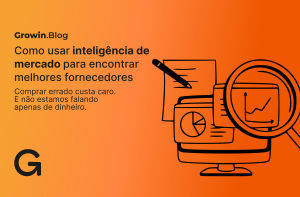Today, AI-analysis and data decision-making are reshaping food manufacturing industry: streamlining supply chains, reducing waste, and ensuring quality consistency.
In 2019, Danone’s partnership with IBM to introduce an AI-driven supply chain solution marked a significant turning point in the food manufacturing industry.By using the power of data analysis and artificial intelligence (AI), Danone boosted its forecasting capabilities and optimized inventory management, leading to substantial cost savings and better alignment with consumer demand.
This successful collaboration is more than just an isolated achievement — it’s a glimpse into the future of food manufacturing.
In this article, we’ll delve into how AI and data analysis are transforming the food manufacturing landscape, why it’s critical for businesses to adopt these technologies, and how industry leaders like GrowinCo are spearheading this revolution.
How AI-Analysis is Revolutionizing Food Manufacturing
Enhancing Efficiency and Reducing Waste
Efficiency is crucial in the competitive world of food manufacturing, where profit margins are often narrow. AI analysis in food manufacturing offers powerful tools to enhance efficiency by providing greater control over every facet of the production process.
The integration of AI with Internet of Things (IoT) devices allows manufacturers to collect real-time data on critical variables such as temperature, humidity, machinery performance, and production speed:
- Data-Driven Process Optimization: AI algorithms can process this information to pinpoint inefficiencies, such as production bottlenecks or excessive energy use, enabling manufacturers to make instant adjustments. According to a study by McKinsey, AI-driven process optimization can improve production efficiency by 10-20% and cut energy consumption by 4-10%.
- Reducing Waste with Predictive Analytics: Waste reduction is another area where AI analysis in food manufacturing can make a substantial impact. By analyzing production data and identifying waste patterns, such as overproduction or quality defects, AI can predict and mitigate these issues. For instance, Barilla, a renowned Italian food company, employs AI to optimize its production process, significantly reducing waste and cutting costs.
- Smart Resource Allocation: AI helps optimize the use of raw materials and ensures production is synchronized with real-time demand forecasts. This smart allocation minimizes spoilage and overproduction, common challenges in the food industry.
AI-analysis helps in predictive maintenance and asset management
One of the hidden costs in manufacturing comes from unplanned equipment downtime, which can disrupt production schedules and lead to significant financial losses.
Traditional maintenance strategies often rely on scheduled checks, which might not accurately reflect the actual condition of the equipment. Because of that, predictive maintenance, powered by AI and data analysis, comes into play:
- Real-Time Monitoring and Predictive Insights: By equipping machinery with sensors to track parameters like vibration, temperature, and operational speed, manufacturers can continuously monitor equipment health. AI processes this data to predict potential equipment failures, allowing for timely maintenance. For example, General Mills’ predictive maintenance systems have reduced unexpected breakdowns, improving equipment uptime by 15% and lowering maintenance costs.
- Proactive Asset Management: Predictive maintenance also helps extend the life of manufacturing assets. By addressing wear and tear issues before they escalate, companies can prevent severe damage and prolong machinery lifespan, ensuring smooth production without costly interruptions.
- Optimized Spare Parts Inventory: With predictive maintenance, companies can maintain optimal spare parts inventory, reducing costs while ensuring the availability of necessary parts.
Quality Control and Food Safety
In the food manufacturing sector, quality control and food safety are paramount. Any lapses can result in costly recalls, damage to brand reputation, and serious health risks to consumers.
AI analysis is revolutionizing how manufacturers maintain quality and safety standards.
- Automated Quality Inspection: AI-powered image recognition systems can inspect products in real-time on the production line, identifying defects or deviations from quality standards more accurately and consistently than human inspectors. Coca-Cola, for example, uses AI-based quality control systems to analyze bottle images, detecting issues like incorrect labeling or packaging damage, ensuring that only top-quality products reach consumers.
- Detecting Contaminants: AI enhances food safety by identifying contaminants. Machine learning models are trained to recognize various contaminants using data from sensors and lab analyses. Companies like Conagra Brands utilize AI systems to monitor contamination, ensuring compliance with food safety regulations and reducing the risk of product recalls.
- Data-Driven Compliance and Traceability: AI facilitates regulatory compliance by maintaining detailed records of production processes and quality checks. This data can trace a product’s origin, verify compliance, and quickly address safety concerns. For instance, IBM’s Food Trust blockchain system, used by Walmart, provides end-to-end traceability, making it easier to track food sources and ensure safety.
Demand Forecasting and Inventory Management
One of the most significant challenges in food manufacturing is aligning production with consumer demand. Overproduction leads to waste, while underproduction causes stockouts and missed sales opportunities.
Given that, AI analysis in food manufacturing offers powerful tools for accurate demand forecasting and efficient inventory management:
- Accurate Demand Prediction: AI-driven forecasting models analyze extensive data sets, including historical sales, market trends, weather patterns, and economic indicators, to predict future demand accurately. Unilever has implemented AI-based demand forecasting tools, improving forecast accuracy by 20%, aligning production with market needs more effectively.
- Dynamic Inventory Management: AI systems manage inventory dynamically by analyzing sales data and stock levels, optimizing inventory in real time, reducing overstocking risks, and preventing stockouts. This capability is particularly valuable for perishable goods, minimizing waste and enhancing profitability. Amazon’s AI-driven supply chain management exemplifies dynamic inventory management, ensuring product availability for customers.
- Optimizing the Supply Chain: AI improves supply chain management by providing insights into demand trends, enabling manufacturers to collaborate efficiently with suppliers, reduce lead times, and ensure raw material availability. Nestlé’s use of AI to optimize its supply chain has resulted in a 5-10% reduction in supply chain costs, highlighting AI’s potential for significant savings.
The Importance of Data-Driven Decision-Making in Co-Manufacturing
Co-manufacturing involves partnerships where one company manufactures products on behalf of another. This collaboration offers scalability and flexibility but also introduces complexity in supply chain management, quality control, and compliance, in which GrowinCo. can be the right choice for your product production.
Data-driven decision-making is crucial in this context for several reasons:
- Transparency and Traceability: Data analysis provides real-time visibility into the entire production process, ensuring transparency and traceability. This capability is essential for meeting regulatory requirements and responding to consumer demands for transparency in food sourcing and production.
- Optimized Resource Allocation: AI can optimize resource allocation across multiple co-manufacturing sites, balancing production loads based on capacity, cost, and proximity to distribution centers. This approach reduces logistics costs and improves overall efficiency.
- Enhanced Collaboration: Data sharing between partners in a co-manufacturing relationship fosters collaboration and alignment. By analyzing shared data, companies can identify opportunities for process improvement, cost reduction, and innovation.
- Risk Management: AI-driven risk assessment models can identify potential supply chain disruptions, quality issues, or compliance risks. Proactive measures can be taken to mitigate these risks, ensuring consistent product quality and minimizing the impact of disruptions.
GrowinCo’s Data-Driven Approach to Co-Manufacturing
At GrowinCo., we believe that the future of food manufacturing lies in harnessing the power of data and AI to drive innovation, efficiency, and quality.
By leveraging advanced data analytics, AI-driven insights, and collaborative partnerships, GrowinCo. is helping food manufacturers optimize their operations and achieve sustainable growth.
GrowinCo. specializes in providing comprehensive co-manufacturing solutions for the Consumer Packaged Goods (CPG) industry, with a strong focus on leveraging data-driven decision-making to enhance efficiency, quality, and sustainability.
With the use of advanced data analytics, GrowinCo. helps partners optimize their production processes, improve supply chain management, and ensure consistent product quality.
Through a collaborative approach, GrowinCo. fosters transparency and open communication, aligning goals and driving innovation. Additionally, the company is committed to sustainable practices, working with partners to reduce waste and minimize environmental impact.
With tailored solutions that meet the unique needs of each partner, GrowinCo empowers food manufacturers to make informed, data-backed decisions that boost operational efficiency, reduce costs, and respond swiftly to market demands.
The Future of AI-analysis in Food Manufacturing
As technology evolves, companies that embrace AI and data analysis will gain a competitive edge in efficiency, quality, and customer satisfaction. The food manufacturing sector is at a turning point, transitioning from traditional methods to data-driven approaches that redefine co-manufacturing, quality control, and supply chain management.
Finally, adopting these technologies, manufacturers can optimize operations, reduce costs, and deliver high-quality products that meet consumer expectations.
GrowinCo. is ready to support this transformation, offering expertise and innovative solutions to help companies succeed in the evolving landscape of data-driven food manufacturing.




